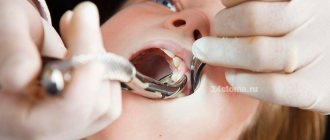One of the fundamental principles of modern dentistry is pain-free dental treatment. However, most adult patients feel nervous while sitting in the dentist's chair, and some are completely unable to overcome the horror that grips them in the dentist's office. When it comes to the treatment of baby teeth, the problem becomes especially acute. The need to visit the dentist can cause real hysterics in a child. If you don’t help your child cope with his fears, in adulthood he will constantly put off visits to the dentist. How to overcome childhood dental phobia?
Content:
- Where does the fear of going to the dentist come from?
- The main mistakes of parents
- How to overcome dental phobia
- Contact the professionals!
Parents who care about their child’s health know how important it is to take their child to the dentist in a timely manner. However, many of them face the problem of fear of visiting the dentist's office. What is the reason that a child is afraid to have his teeth treated? And what should you do when it’s time to make another visit to the dentist? Let's try to figure this out.
Where does the fear of going to the dentist come from?
There may be several explanations for the fact that a child is afraid to go to the dentist. For example:
- Meeting new people. A child's first visit to the doctor's office is just as stressful as the first day of kindergarten, for example. The child has to communicate with new people. Moreover, the interaction is quite close. And in this case, you can consult with a pediatrician on how to prepare your child for a visit to the dentist in order to take into account all the personal aspects of your child specifically.
- Fear of pain. For many, a visit to the dentist is associated with pain and blood, which is the main reason why even adults struggle with the decision to visit the dentist. It is important to explain to the child that now there are many modern treatment methods that make any procedure painless.
- Parents' conversations. You should not talk about your own dental treatment in negative terms in front of your child. After all, this can become another reason for children's fears.
- Psychological discomfort. It is important that the baby feels a positive attitude towards him from the attending physician. If the specialist does not inspire confidence, this will be one of the reasons that the child is afraid of visiting the dentist.
What to do if treatment fails
Let's consider a situation when a child is in a negative mood, and these are those cases when he does not want to enter the office; does not allow the doctor to approach him; refuses to sit in a chair; does not open his mouth, does not allow anesthesia, so his parents and doctor cannot find a way to persuade him to undergo treatment.
So, you spent the entire reserved time at the doctor, but nothing was done. We can talk about the reasons for a long time. How should you behave now?
You may be angry at this moment, most likely upset, or blaming yourself for what happened. You may be completely confused and feel helpless.
In general, you are visited by a whole range of negative feelings. And this is understandable. You had a goal - to cure a child, but unexpectedly an obstacle arose to its implementation. At first it seemed that this was some kind of misunderstanding: the child did not understand that the benefits he would receive were many times greater than the discomfort during treatment. But then you realized that his resistance could seriously complicate matters.
The main mistakes of parents
Often parents themselves make mistakes that lead to the child not wanting to go to the dentist. Moreover, with age the situation may worsen. Among such errors are:
- Psychological pressure. In everyday life, parents, without thinking about their conversations and actions, can form a number of complexes and fears in their baby. For example, knowing that children are afraid of pulling teeth, they can remind them to visit the dentist every time the child asks for candy. This creates a fear in the subconscious of visiting the dentist’s office.
- Another problem with the formation of a psychological barrier before such visits can be intimidation of the baby if he disobeys and behaves badly at the doctor’s appointment. This way the child will form an association of the doctor with a sadist who is at one with the parents.
- Fear of pain. In this case, the child should be explained that the treatment uses drugs that reduce sensitivity. At the same time, if you do not go to the doctor, your teeth may hurt more.
- False promises. When deciding how to prepare a child for a trip to the dentist, some parents resort to the trick of promising that the doctor will not do anything at all, but will only conduct an examination. Or that after visiting the doctor you will go on an exciting trip. If the promises do not coincide with reality, then the child’s mistrust and fear will only increase.
- Excessive emphasis on the problem. There is no need to focus on the fact that at hour X you need to visit the dentist’s office. It is not recommended to remind you once again that there are problems with teeth growth or their condition. It's better to just make an appointment. After all, you don’t have preparatory conversations before going to the park or buying tickets to the circus.
- Lack of motivation. Explain to your child why to visit the dentist's office. This will instill responsibility for maintaining your own health and eliminate unnecessary fears.
Why are children afraid of dental procedures?
All phobias are based on negative experiences, or rather, experienced negative emotions. They are the ones who make children fear doctors - people in white coats. If dental treatment for children has ever been accompanied by unpleasant sensations, if the dentist does not have the necessary professional and psychological skills to treat young patients, the process of developing dental phobia will be launched.
There are a number of factors that contribute to its consolidation. Very often they are explained by the incorrect behavior of close people around the child.
- The emotions of mom and dad are quickly transmitted to kids. If they themselves experience fear or even just noticeably worry before a visit to the clinic, the child will definitely remember this feeling and take it into account.
- Some parents exploit emerging dental phobia for their own purposes, scaring their daughter or son with dental procedures: “If you don’t listen, let’s go to the dentist and let him treat your tooth.”
- Children with certain psychophysiological characteristics are very frightened by the unknown. A child with a soft, indecisive character will be afraid of his first trip to the clinic simply because he does not know what exactly awaits him there.
The value of the individual sensitivity threshold also matters. Adults and children with a low pain threshold will experience severe pain even from the most ordinary manipulations, causing other people only mild discomfort.
How to overcome dental phobia
If you don’t know what to do in a situation where a child is afraid of the dentist, then you should listen to a number of expert advice:
- Start visiting the dentist from the first year of life. Do not think that only molars require treatment. After all, the subsequent formation of molars depends on the correct development of baby teeth. It is important to monitor the condition of the oral cavity from the first days of birth. Therefore, you will need dental consultations from the cradle. And in the future, you won’t have to solve the problem of how not to be afraid of the dentist for children. After all, your baby will perceive the doctor as an assistant and adviser.
- Do not focus your child's attention on visiting the doctor. You should not once again remind your child that a visit to the doctor is scheduled for a specific date. It’s better to check it out during your next walk. The effect of surprise will allow the baby not to fully understand what is happening and not feel fear.
- Choose the right time for your visit. If you decide to come to the doctor early, waking up your baby earlier than usual. Or made an appointment during your lunch nap. If a visit to the doctor is planned instead of a trip to the zoo or entertainment center. If you had to postpone your long-awaited trip to the sea for a scheduled visit to the doctor. Be prepared that your child will develop a negative attitude towards such an event.
- Consider a reward system. Some parents, when looking for a solution to the situation of what to do if their child is afraid to have their teeth treated, resort to the option of placating their child with expensive purchases. However, this is not recommended, since on the one hand, a strong perception is formed that you can only get what you want by going to the doctor’s office. On the other hand, for a child such a visit is associated with additional stress. After all, he understands that parents will not just give money or gifts. This means that serious “tests” await him in the doctor’s office. It is better to suggest that after a visit to the dentist, take a walk to your favorite park, go on rides, and get some kind of souvenir in the doctor’s office. Such a visit should be associated with positive emotions and the exclusivity of the event.
- Set an example. It is important to remember that visiting the dentist for preventive purposes is recommended not only in childhood. Parents should also visit a doctor. And you can do this together with your son or daughter. Show that mom and dad also go for preventive examinations. This will relieve unnecessary fears and allow the baby to feel like an adult, which is very important at the stage of growth and development.
- Accompany your child. Do not leave your child alone in the doctor's office. This applies not only to situations where a tooth needs to be filled or pulled out. Be present during every appointment. This will allow the baby to feel supported and gain confidence.
- Turn your visit to the dentist into a game. You can take your favorite toys with you or buy a children's set of oral hygiene tools. Continue the game at home so that the child at the dentist’s appointment does not think about the treatment process, but perceives what is happening as part of the exciting activities.
- Tell stories. Buy books where the kind Aibolit helps the heroes cure their bad teeth, or the Tooth Fairy grants wishes and gives amazing miracles. Let your child become the hero of one of these fairy tales during a visit to the dentist.
- Find options to shift your attention. Ask the doctor to turn on an interesting cartoon, or tell a fairy tale or funny story yourself while the baby is in the dentist’s chair.
- Visit one doctor. Let your child get used to the doctor. After all, by trusting a child will be able to cope with fear faster.
- Talk to your child. Explain to your child why to visit the dentist. Tell us that if you regularly check the condition of your oral cavity, you can avoid caries and the need to remove a tooth. Motivate your child for preventive examinations that will maintain oral health.
- Schedule an orientation visit. There is no need to wait until your teeth hurt or your bite needs correction. It is better to include a visit to the dentist in the plan of important events without any special reason. In this case, the child’s first visit to the dentist will not leave associations with pain and other unpleasant manipulations in his psyche. After all, it will just be an inspection. And subsequent visits will form a clear understanding that visiting the dentist is a habitual activity that is not associated with painful sensations.
- Build independence. Encourage your child to manage his or her own schedule for visiting the doctor's office. Explain why this needs to be done every six months. This way, the baby will be able to feel like an adult who has been entrusted with the responsibility for monitoring his health.
- Don't cause problems. For parents, this advice should be basic. After all, it is not at all necessary to wait until the child begins to complain of toothache or the problem arises of the need for professional teeth cleaning, bite correction, milk tooth removal, or gum treatment. It is better to prevent problems and eliminate them at an early stage. And then you won’t have to think about the question of why children are afraid of the dentist. After all, a visit to the doctor will become as common as visiting a kindergarten, a visit to a hairdresser or a tutor.
And, of course, look for your dentist. After all, if a child is afraid to pull out a tooth, then this is quite natural and justified. Not every adult is ready to undergo such a procedure without fear. But in the case when a child becomes nervous, irritable, and capricious before each visit to the dentist, then you should think about the qualifications of the specialist you are visiting.
Parenting during treatment
Many parents want their child to make an extremely favorable impression on others. And therefore, if a child, in their opinion, is doing something wrong, they immediately begin to educate him.
According to doctors, such an attitude towards a child in the office can negatively affect his behavior during treatment.
- There is no need to raise a child during treatment unnecessarily. Still, he is so excited that he is unlikely to pay attention to you. Before you pull your child away in the office, ask your doctor if your child is doing anything inappropriate. Maybe this is allowed.
- Comparing a child with other children also usually does not bring the desired results. If you compare a child with someone else, he feels that he is not loved for who he is. Comparisons are only permissible with himself. For example: “When you were younger, you really liked coming here.”
An individual approach is important here:
If your child is timid, quiet and obedient, especially with strangers. Give him complete freedom in the office. Under no circumstances should you pull him back: “go there; say thank you; wipe your nose”, etc. With such a character, he is unlikely to do anything inappropriate. If the child does something wrong, the doctor or assistant will tell him about it. By limiting the freedom of a shy child, it will be very difficult to form a trusting relationship with him. And trust is the key to successful treatment.
If your child is mobile, active, feels at home in any unfamiliar room, and does not distinguish other people's things from his own. Such a child must be restricted in the office. When entering, explain the rules of behavior to him. Along with what not to do, it is necessary to say what can be done. In order for the child’s great interest and need to move to be realized.
The fight for health
The child cries, does not want to sit in a chair, refuses to comply with adults’ requests, is restless, bites, or simply remains silent and does not talk to anyone. All this prevents the doctor from fully providing treatment.
What should a parent do?
It is clear that you really want the treatment to take place. And you are trying with all your might to help the doctor persuade the child to open his mouth. But this strong personal involvement can create problems. Therefore, to begin with, give the doctor, as a more independent person, the opportunity to come to an agreement with the child himself. Wherein:
- do not try to control the child in this situation;
- do not indulge the child, do not beg him, do not beg on your knees. According to doctors, this parental behavior makes the child uncontrollable;
- do not intimidate or threaten the child so that he stops resisting the doctor. Even if this has an effect, it is short-lived. The child quickly begins to behave in the same way and continues to be afraid of the doctor.
Before you do anything, try to understand what the child is thinking and feeling right now. How does this situation look from his side?
- Help your child understand during treatment what he is feeling: where the unfamiliar sounds are coming from; what he can feel.
The main goal is for the child to have as many intact teeth and a correctly formed bite as possible. And it’s not that he sits down in a chair at the moment and opens his mouth. This means, first of all, the child’s trust must be won as the basis for stable positive interaction.
Let the child get acquainted with the doctor, assistant, and office environment. Learn how different tools work. He will try to control them himself.
The most important thing is to maintain positive memories of the doctor and treatment. Even if it was not possible to do anything that was planned, the child should leave the doctor in a good mood, and not with a feeling of guilt and the feeling that he is bad.
Contact the professionals!
The Dr. Keller clinic employs pediatric dentists who can find an approach to your child. They will provide comfortable reception conditions, tell the baby how important it is to take care of oral hygiene, and will be able to become the child’s true friends who can be trusted. They will prove that you can treat teeth without fear and pain. After all, their task is a healthy smile for every child who comes to the dental office. Dr. Keller makes dental treatment fun. And you need to tell your baby about this. So, if you haven't visited the dentist's office yet, now is the time to make an appointment!
At what age should children be taken to the dentist?
Experts say: the sooner you start doing this, the better it will be. “You need to see a dentist every 6 months, even if there is nothing bothering you and the parents think everything is fine. In addition, such visits to the doctor remove the main fear - the fear of the unknown, notes Alexander Chernykh. “The child will know from an early age that the dentist helps, he is a friend and he can be trusted.”
But if you put off visits to the dentist until the last minute and bring your child to the dentist in case of acute pain, the child’s reaction may be unpredictable. Most likely, he will get the same negative experience from treatment and pain that will poison subsequent visits to the doctor.
Literature
- Boyko V.V. Recognizing and overcoming fear at a dental appointment // Institute of Dentistry, 2002. – No. 1, 4. – P. 15-23.
- Vinogradova T.F., Snagina N.T. Guide to pediatric dentistry // Medicine, 1995. – pp. 75-83.
- Gashimov R.G., Arakelova M.N. Psychological characteristics of children with dental diseases // Dentistry, 1988. – pp. 58-60.
- Ivanov G.G., Ivanova M.A. Assessment of the psycho-emotional state of children // Childhood Dentistry and Prevention, 2001. – No. 1. – P. 23-26.
- Lepelin A.V., Sutenkov D.Ya., Kazakova L.N. Psycho-emotional stress as the basis of dental phobia and the cause of the development of fear // Pediatric dentistry and prevention, 2004. - No. 3. – P.18-25










